Continuing with my field notes in analyzing the 80 Days video game, as a part of my studies in Digital Games, Learning, and Pedagogy (ETEC 565S), this game log reflects my initial experiences in my first playthrough.
Name of Game: 80 Days
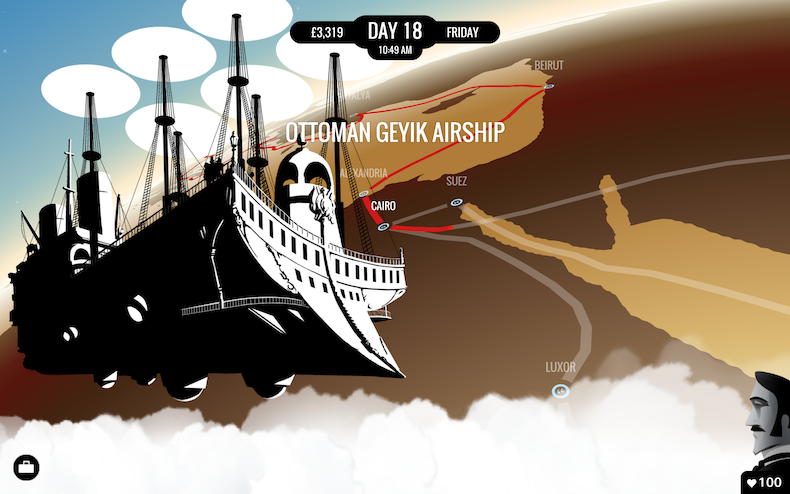
Date Analyzed:
Tuesday August 11th, 2020
Session 2: Solo Playthrough
Play the game on your own: familiarize yourself with the controls, mechanics and interface; get an initial understanding of the game’s narrative and its aesthetic. Your goal is to “get a feel” for what it is asking from you, in terms of: inputs, emotion, and attention.
Note: If you use outside help at any point, make a note of that. The effort here is not to do anything “correctly”, but to diligently record whatever you do as you try to get a ‘handle’ on the game.
a) Descriptive Notes
Just write as you play — write anything descriptive, records of objectives, hints, fragments of ideas, anything. You may elect to write as you play (i.e. pausing the game) or right after you have completed a play session. Try to get at least 60 minutes of play time.
- very different game from what I was expecting, but thoroughly enjoyable – got so wrapped up in the story that over an hour and a half flew by before I realized it
- this is a story that allows for the reader to choices that effect the stories outcome

- choose your own adventure story / game
- I’d been questioning how a choose your own adventure was being categorized a game, as oppose to simply an interactive story, but I am seeing it in the game play here. There is definite strategy and choice at play.
- hint: a notebook way be useful for jotting down information given to you in conversations with other characters – although these do also show up in references to places that they’ve mentioned on the map
- hint: pack the transit map – hugely helpful
- hint: if you are given the option to get off a train before reaching a destination – don’t – this is a not a stretch break – the train will continue without you
- hint: you can sell items at the market by dragging them out of your suitcase
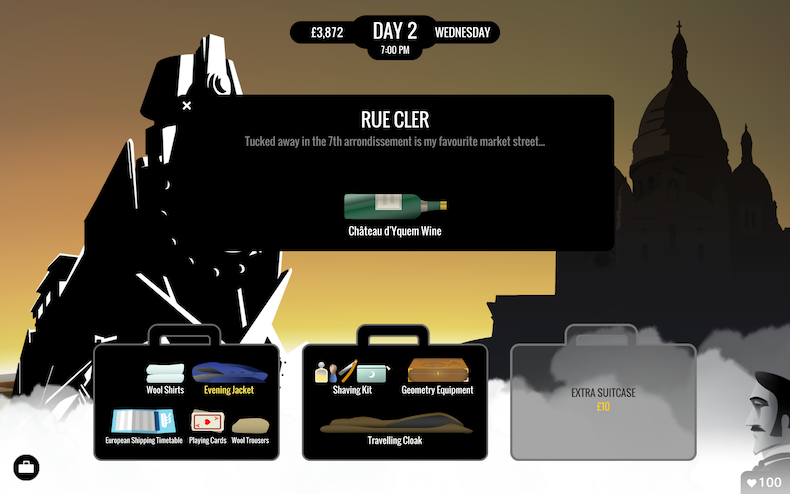
- hint: be careful of how many bags you are carrying – they can cost you a fair bit extra
- hint: save money on hotels with overnight train travel
- this is not the real world of 1872 – rather a steampunk storyworld that has been created around the premise of Jules Verne’s Around the World in 80 Days
- curious if I read Jules Verne’s Around the World in 80 Days if it will add additional layers to the story
- need to look up what was happening in history in 1872 to see if this is echoed in the elaborate story of war, feuding Guilds, and the imaginative steampunk elements
- I wish the news articles offered more details than simply the headline
- being able to snap photographs for postcards is a fun in-game feature
- the summary of my travels is fun, but I wish that lead to an actual forum where you could interact with other travellers, have a virtual drink in a pub, and share bits and pieces on this new world that we’d all become a part of
- hint: keep an eye on the clock – especially when buying travel tickets, so you don’t miss departures
- chuckled at myself, as in this context it turns out I was much better at speedy travel then I thought I’d be
b) Affective Notes
Playing and analyzing games are subjective activities — as you played, you were likely: engaged, irritated, startled, sympathetic, angry, bored, etc. Identify the affective responses you had while playing, and do your best to account for the in-game circumstances that gave rise to them (i.e. where, when, intensity, etc.) Don’t worry about being exhaustive, just mention what you think matters.
- excitement at the opener – it felt like a movie with the perfect scoring for embarking on an adventure
- thrill at the notion of some of the steampunk inventions in the game – like the Amphitrite Express, a submersible train
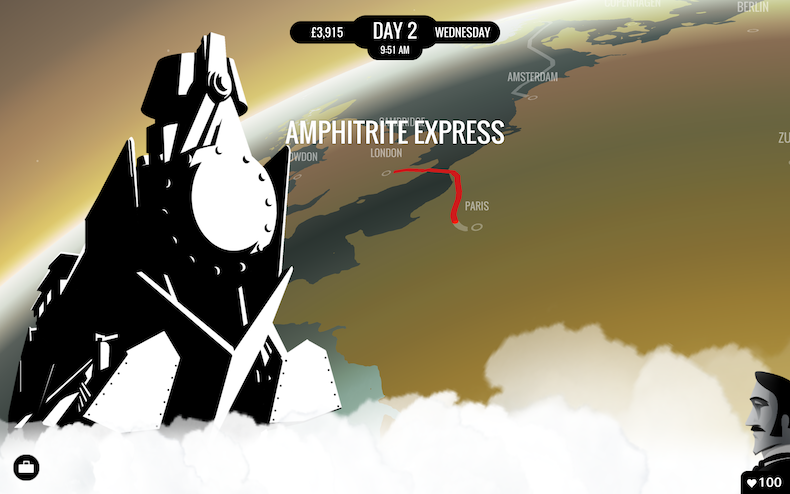
- engaged by my explorations in the different cities
- irritation that the suitcases don’t fit more items
- frustration at missing a train or having to pay extra for baggage
- curiosity in what the conversations with locals will reveal
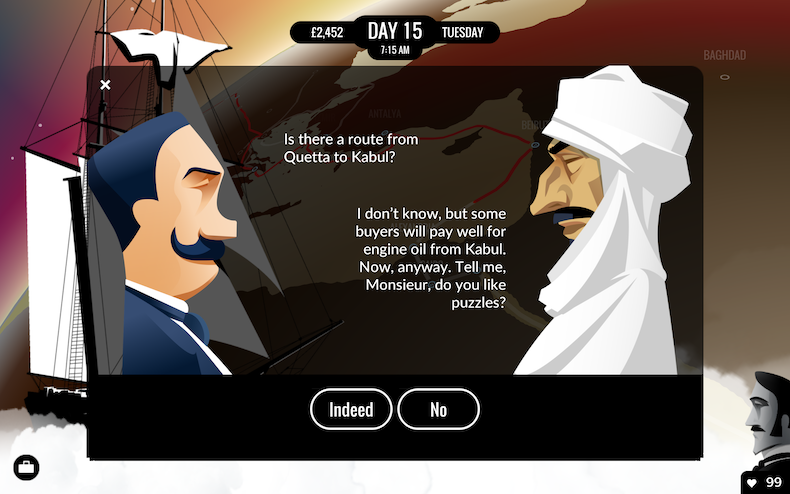
- conflicted as to what to feel in my conversations with locals on the politics, as I am yet to be familiar with it and what is going on
- frustration that the driver to Budapest would not talk further
- embarrassment and frustration that I chose to sit with the journalist on the train, even after he’d said goodbye – felt like wasted time
- irritation that I stepped off the train in Thessaloniki, thinking the option was for a stretch break, only to see the train leave us on the platform
- more irritation that I still wanted to continue on to Athens but it would now cost us a lot more to make that journey, after stepping off the train in Thessaloniki
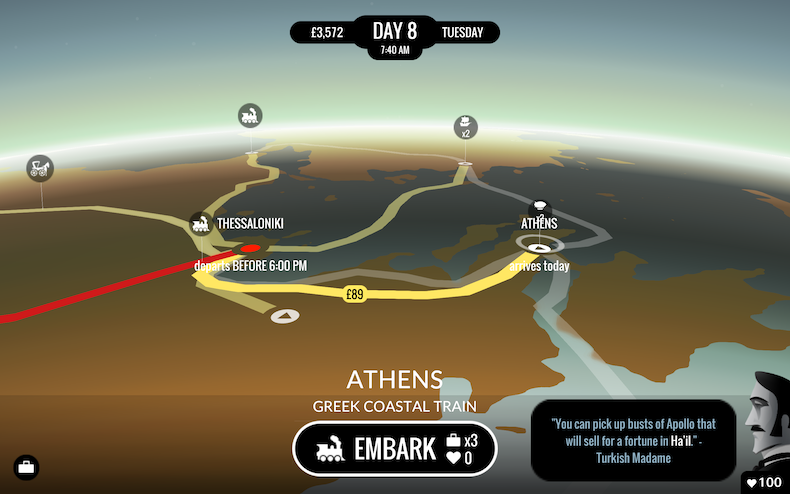
- excitement at earning so much money for the geometry equipment at the market in Budapest
- curiosity at what I will find if I follow a conversation to Izmir
- foreboding at the mechanical army in Vienna
- fear upon boarding a ship to Karachi with a questionable crew
- sense of accomplishment after making a sale that tripled our money
c) Analytic Notes
After playing, consider your experience more holistically — What problems did it present me with? What options did it give me (to address those problems)? When and how does the game invoke gender, class, race, violence in ways that might be problematic? Reflecting on Bogost, what do you think the video game DOES or enact? What about learning? Does anything stand out as a ‘defining’ or ‘unique’ feature of the game?
Problems Presented:
- figuring out the fastest routes
- making sure that we were not robbed or swindled
- managing our finances
- earning additional money
- keeping us healthy
- luggage space

Options to Address the Problems:
- doing additional work for money
- buying and selling goods along the way
- repacking suitcases
- buying extra luggage space
- asking questions and gaining tips from characters in the game
- stopping to rest where needed
Elements of Game Play around Gender, Class, Race, Violence in Ways that Might be Problematic:
- there are definite examples of classism in the way you are treated in the game from how you are dressed – but at times the advantage is towards looking as though you fit in and at other times towards giving the impression of a gentleman
- there are certainly threats of violence at points in the game, but so far we’ve managed to avoid an outright violence
- there are certainly suggestions in places of flirtation and distrust between male and female characters
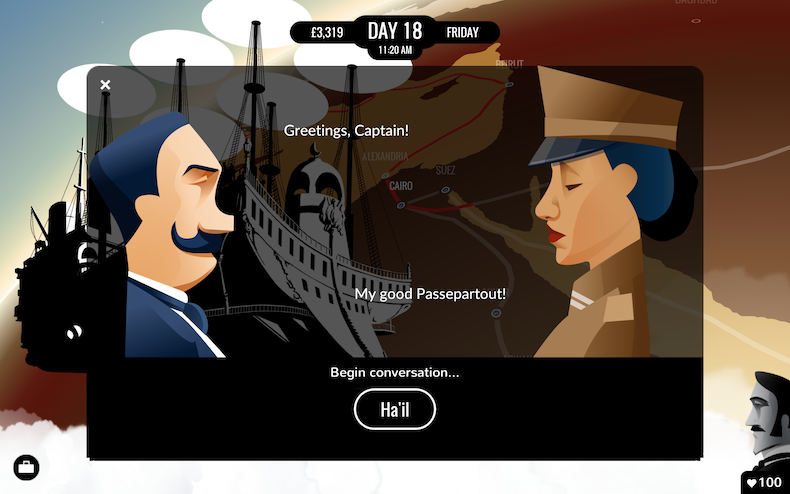
I’d say though that none of the above is problematic, rather it is realistic to what you navigate as a traveller, getting the player to think about the circumstances of others and inequities that people face. In fact, had the game been more historically inaccurate, we might have seen much more of this, but we did not, and I was pleasantly surprised to discover many female characters throughout the game in positions of leadership.
What is the Video Game Doing or Enacting?
- while the games goal is to travel around the world in 80 days, I think ultimately the game is building empathy and understanding of different people’s perspectives and choices based on their circumstances and the pressures placed upon them

- there is certainly also an appreciation shared within for the steampunk genre of art and imagination, a love of travel and different modes of transport, and an cherishing of literature
Elements of Learning:
- instil a love of literature, both new and classic stories
- world geography
- modes of travel (even if some within 80 Days are ficitious)
- empathy
- spark an interest in learning about history and culture, and how those impact an individual
Defining or Unique Features of the Game:
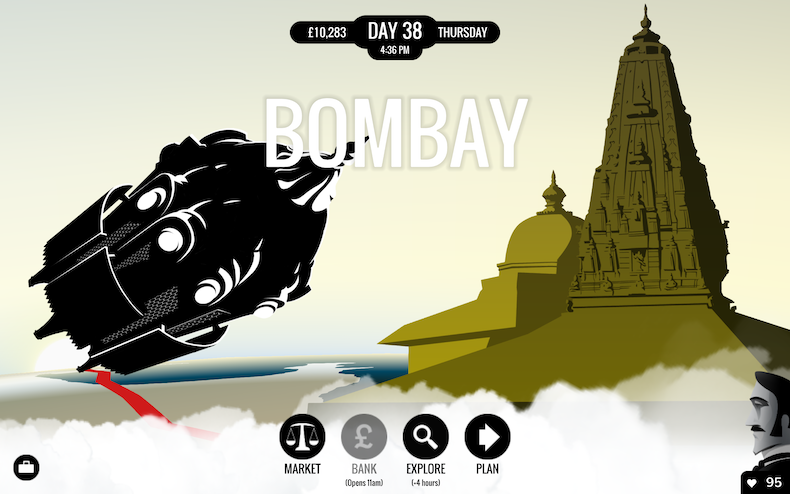
- the steampunk twist to an old story
- positive and multi-layered depictions of female characters
- encouraging empathy and interest in culture, history, and geography through playing your way through an elaborate and fantastical story, overlaps with realism
Fieldnote Summary Session 2
At the end of your fieldnotes for session two, craft one or two sentences (no more) that, for you, summarize your experiences of learning this new game, and what specific elements/skills/etc., based on your experience of solo play, to be the most important in getting a ‘handle’ on the game. Include at least one image that demonstrated this / these crucial game elements / skills / characteristics.
80 Days is a very different game from what I was expecting, but one that I am thoroughly enjoying, as I get wrapped up in the story and attempt to navigate the globe strategically without running out of money. The trick seems to be engaging other characters, to open up new routes of travel and gain tips, as well as using my time wisely upon arrival at a new destination, keeping a close eye on the time, lest you miss your desired departure.
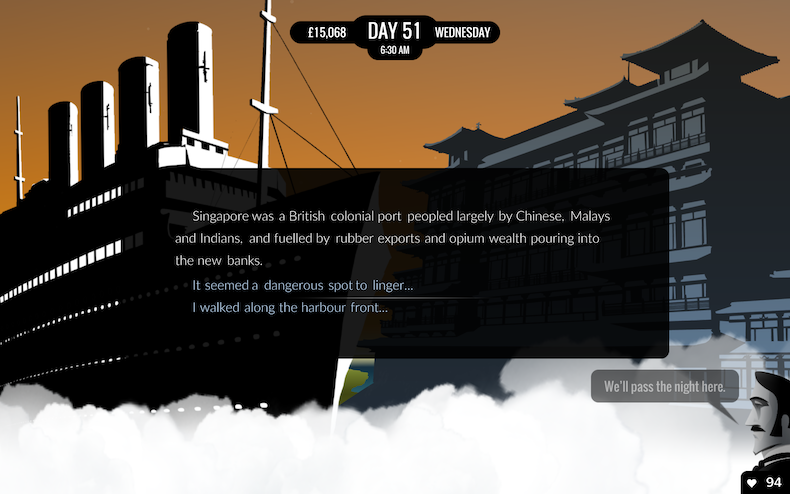
Leave a Reply